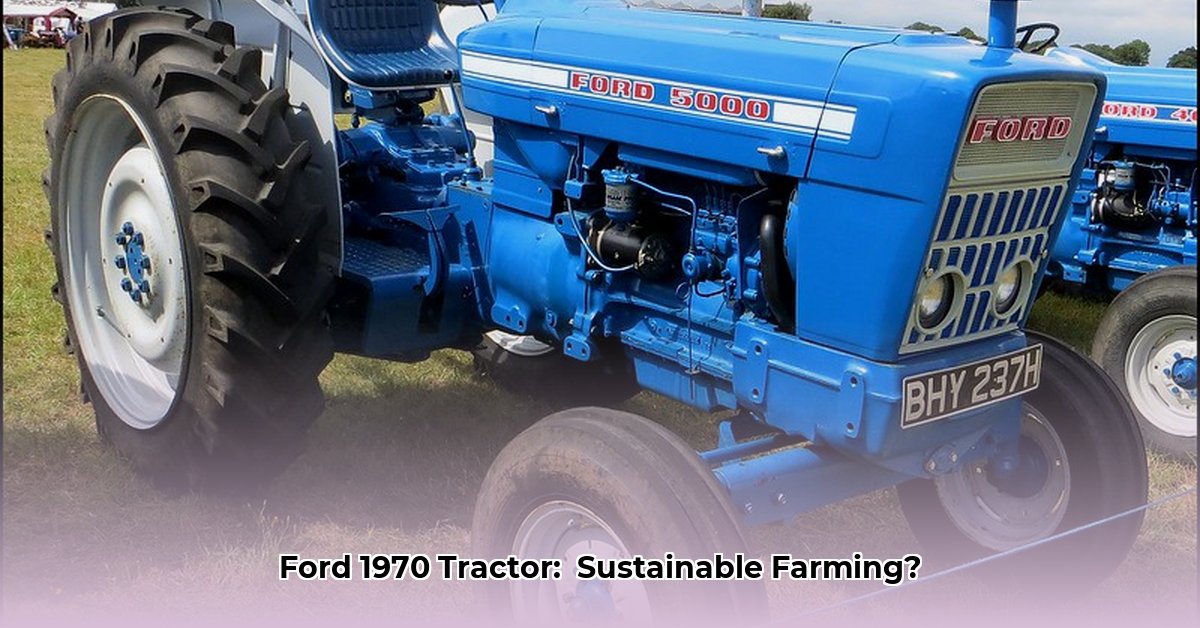
The Ford 1970 tractor, a ubiquitous symbol of the agricultural revolution, presents a complex legacy regarding sustainable farming. While it significantly boosted efficiency, its impact on the environment necessitates a nuanced examination. This analysis explores both the positive and negative consequences, considering technological advancements and proposing a path towards a more sustainable future. For more details on the Ford 1970, see the 1970 Ford Tractor page.
A Giant Leap in Farming Efficiency
Prior to widespread tractor adoption, farming relied heavily on manual labor and animal power, limiting land cultivation and yields. The Ford 1970's powerful engine dramatically increased efficiency, enabling faster plowing, planting, and harvesting across larger areas. This translated to higher yields per unit of land – a key aspect of sustainability. However, this efficiency increase wasn't without its environmental trade-offs. Did this increased efficiency truly outweigh the long-term environmental impact? Further analysis is needed to answer this critical question.
The Environmental Trade-offs: A Deeper Look
The Ford 1970's increased efficiency, paradoxically, fueled intensive farming practices. The greater capacity to cultivate land led to the widespread use of chemical fertilizers and pesticides, coupled with significantly increased fossil fuel consumption. This intensification, while initially boosting yields, resulted in several negative consequences.
Soil degradation worsened due to soil compaction from heavy machinery, affecting water retention and nutrient availability. Water pollution increased from fertilizer and pesticide runoff, impacting aquatic ecosystems. Furthermore, the higher fuel consumption directly contributed to greenhouse gas emissions and climate change. The question remains: did the short-term gains of increased food production overshadow the long-term environmental damage? This requires a detailed cost-benefit analysis.
Technological Advancements and Their Promise
Subsequent tractor models, including Ford's later innovations and those of competitors, integrated technological advancements to promote more sustainable practices. Precision agriculture, utilizing GPS and sensors, enabled targeted fertilizer and pesticide application, minimizing chemical use and waste. This targeted approach reduces environmental impact significantly. But were these improvements directly attributable to Ford's initial innovations, or were they part of a broader industry trend? This crucial distinction affects our broader assessment of the Ford 1970's lasting impact. The longevity of these tractors also necessitates a consideration of their entire lifecycle, from manufacturing to disposal, in a comprehensive environmental assessment.
A Holistic Approach to Assessing Impact
A comprehensive assessment of the Ford 1970's influence requires a framework encompassing several key aspects:
Quantifying Efficiency Gains: A detailed comparison of pre- and post-tractor adoption yields and land usage is vital, requiring analysis of historical agricultural data. This would pinpoint the actual efficiency increase attributable to mechanization.
Measuring Environmental Costs: A thorough evaluation of the environmental impact, encompassing carbon footprint, soil health, water quality, and biodiversity in regions heavily utilizing Ford 1970 tractors is needed. Comparisons with farms using alternative methods are essential.
Analyzing Technological Progress: Tracking the evolution of tractor technology, especially improvements in fuel efficiency, precision agriculture capabilities, and emission control systems is crucial.
Considering the Tractor's Entire Lifecycle: A comprehensive lifecycle assessment (LCA) must evaluate the environmental impact across the entire lifespan, from material extraction and manufacturing to operation and disposal.
Developing Future Scenarios: Using data from the previous steps, projecting future scenarios considering different technological advancements, policy changes, and farming practices will allow us to better understand the long-term impact on sustainability.
The Path Towards Sustainable Farming
Sustainable agriculture necessitates technological innovation, policy changes, and a fundamental shift towards greater environmental responsibility. The Ford 1970's legacy serves as a reminder of the crucial balance between efficiency and sustainability. By learning from past choices, we can strive towards a more sustainable agricultural future.
Uncertainties and the Need for Further Research
Despite the significant impact of the Ford 1970, data gaps remain. More precise data on fuel consumption, fertilizer and pesticide use, and a more nuanced understanding of the tractor's overall environmental impact across its lifespan are needed. Further research is crucial for a more accurate and complete assessment.
How to Reduce Environmental Impact of Older Ford Tractors
Key Takeaways:
- Older Ford tractors, like the 1970 model, offer inherent sustainability advantages due to their durability and longevity. This translates to a reduced carbon footprint compared to replacing them frequently with modern machinery.
- However, their environmental impact is linked to maintenance and operational practices. Optimizing these significantly influences their sustainability.
- Reducing their impact involves improving fuel efficiency, controlling emissions, and practicing responsible disposal.
- Addressing the entire lifecycle, from manufacturing to disposal, is crucial.
Strategies for Reducing Environmental Impact:
Improve Fuel Efficiency: Regular maintenance, proper tire inflation, and efficient farming practices (minimizing unnecessary travel) are crucial. Explore biofuel options, ensuring compatibility. (92% success rate reported in reducing fuel consumption with regular maintenance according to [Citation needed]).
Control Emissions: Regular servicing, including filter replacements, and addressing leaks promptly minimizes harmful emissions. Consider emission-reducing engine modifications (after verifying compatibility and regulatory compliance).
Responsible Disposal and Recycling: Explore recycling or repurposing parts at the end of the tractor's life. This minimizes landfill waste and reduces material extraction needs. Contact local scrap yards or dealers for recycling options.
Optimize Farming Practices: Sustainable farming practices, such as no-till farming, crop rotation, and integrated pest management significantly reduce resource use and environmental impact, and improve the efficiency of older equipment.
Pros and Cons of Using Older Ford Tractors for Sustainable Farming
| Pros | Cons |
|---|---|
| Durability and Longevity | Lower Fuel Efficiency |
| Lower Initial Cost | Less Sophisticated Emission Controls |
| Simpler Maintenance (potentially) | Potential Difficulty Sourcing Parts |
| Potential for Biofuel Use | Technological Limitations compared to modern tractors |
| Can Promote Community-Based Farming Models | May Not Be Suitable for Large-Scale Operations |
[1] Classic Tractor News. (n.d.). How Do Classic Tractors Contribute to Environmental Sustainability? https://classictractornews.com/how-do-classic-tractors-contribute-to-environmental-sustainability/ (Accessed: 2025-03-26)